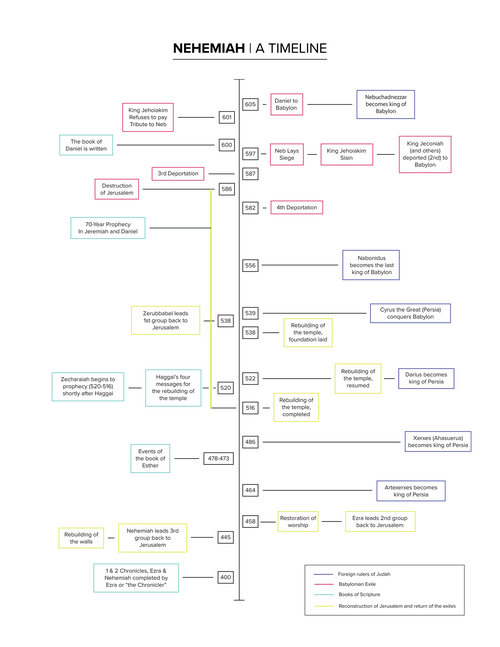Nehemiah : WK 6 - WED
Rumors
Nehemiah 6:5-9
The fifth time, Sanballat’s servant came with an open letter in his hand, and this is what it said:
“There is a rumor among the surrounding nations, and Geshem tells me it is true, that you and the Jews are planning to rebel and that is why you are building the wall. According to his reports, you plan to be their king. He also reports that you have appointed prophets in Jerusalem to proclaim about you, ‘Look! There is a king in Judah!’
“You can be very sure that this report will get back to the king, so I suggest that you come and talk it over with me.”
I replied, “There is no truth in any part of your story. You are making up the whole thing.”
They were just trying to intimidate us, imagining that they could discourage us and stop the work. So I continued the work with even greater determination.
After facing Nehemiah’s repeated rejections, Sanballat’s team transitions from entrapment and distraction to the art of spreading rumors.
Rumors typically have a distinct DNA. Firstly, they thrive on anonymity. When someone comes to report that, “People are saying…” I usually assume they are one of the people saying it. Additionally, rumors are often shared randomly rather than with the individuals the rumor concerns. I find that asking, “Do you mind if I quote you on that?” usually shuts the conversation down.
The second popular ingredient of a rumor is exaggeration. Take a bit of fact, spice it up with bad motives and evil intent, and then bathe it in exaggerated language. Now you’ve got yourself a rumor that is easy to spread.
The third practice to perpetuate a rumor is to conveniently omit crucial context. Avoid including clear reasons for what happened or comprehensive paragraphs of surrounding information if you intend to spread gossip. Inject a tone of surprise as you share, even when you know full well why something occurred.
Finally, rumors are never started to build someone up. Can you imagine someone going to the trouble to make up stories to highlight the impressive qualities of those around you? Rumors are designed to hurt and tear someone down. This is not the spirit of Christ. Paul reminds us, “Let everything you say be good and helpful, so that your words will be an encouragement to those who hear them.” (Ephesians 4:29)
No matter how untrue they are, rumors hurt and distract. They consume large amounts of energy intended for the work of God’s Kingdom. So heed the lesson from Nehemiah: identify rumors as just that, and continue the work with even greater determination.
Nehemiah 6:5-9
The fifth time, Sanballat’s servant came with an open letter in his hand, and this is what it said:
“There is a rumor among the surrounding nations, and Geshem tells me it is true, that you and the Jews are planning to rebel and that is why you are building the wall. According to his reports, you plan to be their king. He also reports that you have appointed prophets in Jerusalem to proclaim about you, ‘Look! There is a king in Judah!’
“You can be very sure that this report will get back to the king, so I suggest that you come and talk it over with me.”
I replied, “There is no truth in any part of your story. You are making up the whole thing.”
They were just trying to intimidate us, imagining that they could discourage us and stop the work. So I continued the work with even greater determination.
After facing Nehemiah’s repeated rejections, Sanballat’s team transitions from entrapment and distraction to the art of spreading rumors.
Rumors typically have a distinct DNA. Firstly, they thrive on anonymity. When someone comes to report that, “People are saying…” I usually assume they are one of the people saying it. Additionally, rumors are often shared randomly rather than with the individuals the rumor concerns. I find that asking, “Do you mind if I quote you on that?” usually shuts the conversation down.
The second popular ingredient of a rumor is exaggeration. Take a bit of fact, spice it up with bad motives and evil intent, and then bathe it in exaggerated language. Now you’ve got yourself a rumor that is easy to spread.
The third practice to perpetuate a rumor is to conveniently omit crucial context. Avoid including clear reasons for what happened or comprehensive paragraphs of surrounding information if you intend to spread gossip. Inject a tone of surprise as you share, even when you know full well why something occurred.
Finally, rumors are never started to build someone up. Can you imagine someone going to the trouble to make up stories to highlight the impressive qualities of those around you? Rumors are designed to hurt and tear someone down. This is not the spirit of Christ. Paul reminds us, “Let everything you say be good and helpful, so that your words will be an encouragement to those who hear them.” (Ephesians 4:29)
No matter how untrue they are, rumors hurt and distract. They consume large amounts of energy intended for the work of God’s Kingdom. So heed the lesson from Nehemiah: identify rumors as just that, and continue the work with even greater determination.
- When someone tells you something salacious, what is your strategy for redirection?
- Who do you know that has suffered from the attack of rumors? How can you encourage them?
- Have you recently been involved in spreading rumors? What would you like to say to Jesus about it?


No Comments